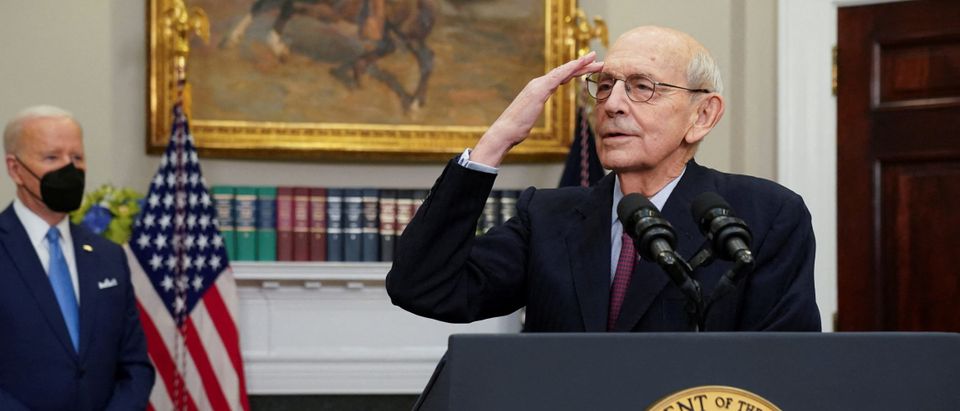Supreme Court Justice Stephen Breyer informed President Joe Biden in a new letter that he will officially retire Thursday at noon.
The letter, sent Wednesday, informs Biden that Breyer will retire “from active service … effective on Thursday, June 30, 2022, at noon,” according to a copy published by the Supreme Court. Judge Ketanji Brown Jackson, whom Biden nominated to the Supreme Court in February, will replace Breyer.
“You have nominated and the United States Senate has confirmed the Honorable Kentaji Brown Jackson to succeed me in the office, and I understand that she is prepared to take the prescribed oaths to begin her service as the 116th member of this court,” Breyer wrote to Biden. (RELATED: Senators Signal Three Issues That Will Define The Ketanji Brown Jackson Hearings)
“It has been my great honor to participate as a judge in the effort to maintain our Constitution and the Rule of Law,” Breyer concluded.
NEW: Justice Breyer has sent a letter to President Biden informing him that his retirement will be effective 24 hours from now: at noon on Thursday, June 30. pic.twitter.com/3nLsKkPKCB
— Steven Mazie (@stevenmazie) June 29, 2022
Jackson will be handed “all remaining opinions ready during this Term” beginning Thursday at 10 a.m., according to the letter. Breyer is retiring after the Supreme Court releases its two remaining opinions Thursday.
JUST IN: Supreme Court says all remaining opinions (2) will be released tomorrow morning starting at 10am.
They are big cases on EPA’s ability to widely regulate power plants, and on the Biden administration’s authority to end Trump’s Remain in Mexico policy.
— Jessica Schneider (@SchneiderCNN) June 29, 2022
The 83-year-old justice is the second-longest serving current member, and his retirement was due to take effect at the start of summer recess as long his successor had been decided on and approved. Biden, speaking in January just after news of Breyer’s impending retirement broke, reiterated his promise to nominate the “first black woman” to the court.
Breyer was appointed to the Court by President Bill Clinton in 1994. He is the longest-serving member of the Court’s liberal bloc and the second-longest serving current member after Associate Justice Clarence Thomas.
Breyer’s retirement date coincides with renewed focus on the Supreme Court after its monumental 6-3 decision to strike down Roe v. Wade, which had deemed that abortion was protected under the U.S. Constitution.
Breyer joined Justices Sonia Sotomayor and Elena Kagan in the dissent, where they argued that the decision “discards” the “balance” the Supreme Court previously found in “respecting a woman as an autonomous being” and protecting an unborn baby’s life.
“Enforcement of all these draconian restrictions will also be left largely to the States’ devices. A State can of course impose criminal penalties on abortion providers, including lengthy prison sentences. But some States will not stop there. Perhaps, in the wake of today’s decision, a state law will criminalize the woman’s conduct too, incarcerating or fining her for daring to seek or obtain an abortion,” the trio of liberals argued in their dissent.


